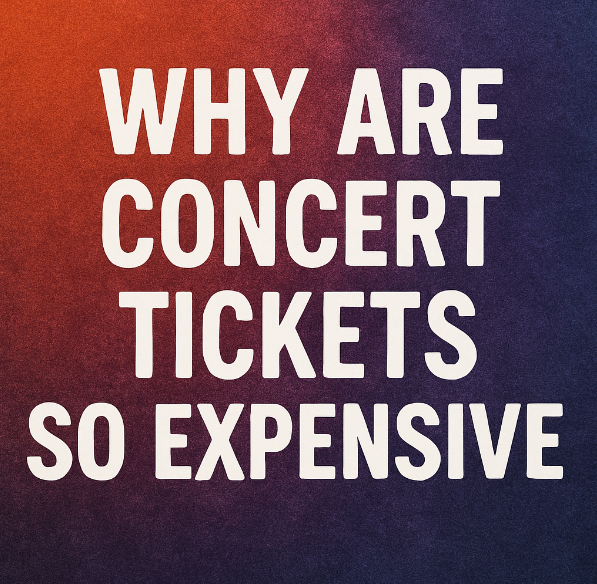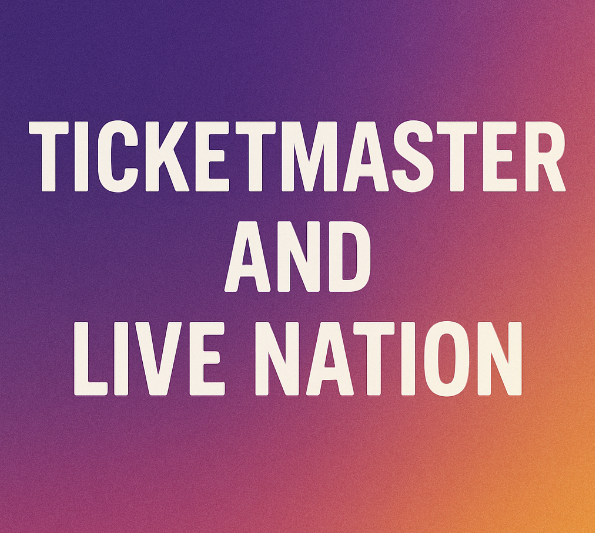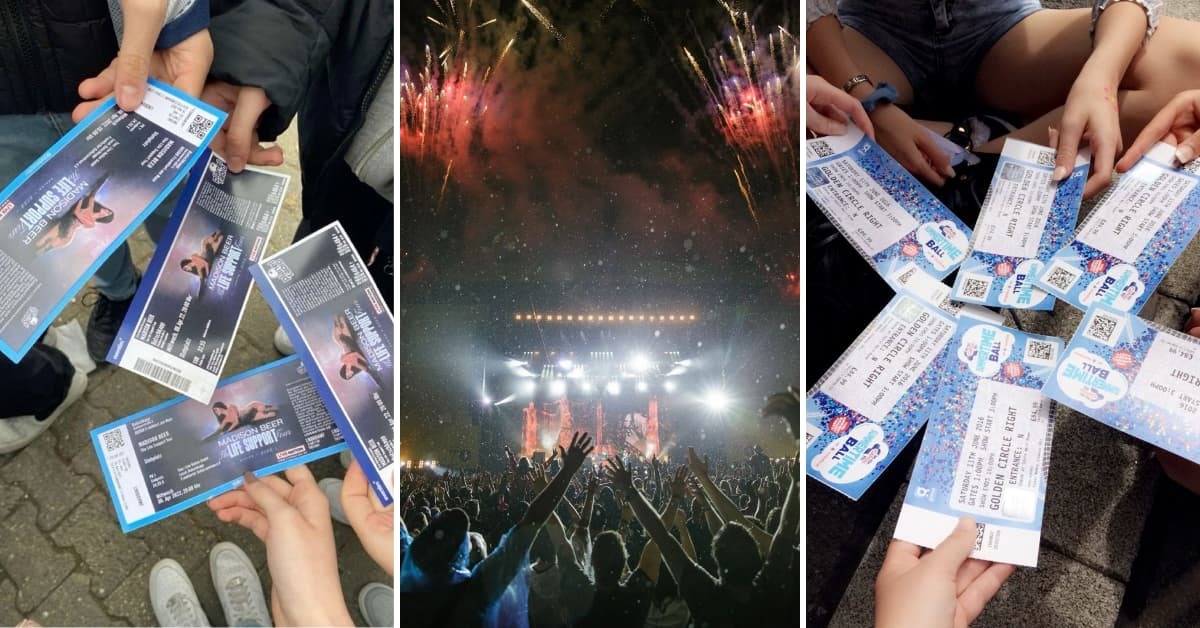The days of affordable shows seem to be disappearing, with prices for popular artists reaching unbelievable levels.
Two major factors driving this trend are the fundamental economic principle of supply and demand in the post-pandemic concert boom, and the ticketing industry giants follow a monopoly regime.
In this article, I’ll explore the entire ecosystem behind concert ticket pricing, from production costs to dynamic pricing models, and offer insights on how you might still grab affordable tickets.
Why Are Ticket Prices So High For Concerts?
The high prices of today’s concert tickets aren’t just your imagination. They’re the result of a complex web of industry factors. There are also the most famous singers in the world, whose concert ticket prices go incredibly high.

Let’s explore the major forces driving these price increases.
The Surge In Demand Post-Pandemic
When we couldn’t attend live events during the pandemic, the craving for in-person experiences has exploded since venues reopened. After years of streaming concerts from our living rooms, fans are now willing to pay premium prices to see their favorite artists in person.
Due to this, the prices were nearly doubled for what you’d paid to see the same band five years earlier. In 2024, Live Nation celebrated its most successful year, with record-breaking attendance of 151 million fans across nearly 55,000 events and a 3% revenue increase to $23.16 billion, driven by a global surge in live music demand.
This demand created more fans competing for the same limited seats, driving prices upward. Artists and promoters have recognized this willingness to pay and have adjusted their pricing strategies accordingly.
Escalating Production And Touring Costs
Modern concerts include immersive spectacles with elaborate stage designs, sophisticated lighting systems, and cutting-edge technology. You’re contributing to an increasingly expensive production when paying for a ticket.
Taylor Swift’s Eras Tour, for instance, involved a massive budget for costumes, makeup, hair styling, backup dancers, instrumentalists, and security, totaling over $4.3 million for the European leg alone. For artists, taking back these costs through ticket sales is essential.
Transportation expenses have skyrocketed, too. According to music industry analysts, fuel costs for tour buses and cargo trucks increased by 35% between 2019 and 2024. In Australia, insurance costs for live music venues have increased significantly, with some venues seeing premiums quadruple since pandemic restrictions ended.
These escalating costs get passed down to us as concertgoers. The artists aren’t necessarily making more profit. They’re often just trying to break even on increasingly expensive productions.
Additional Read: Take a look at how much artists make on Spotify to understand the financial status that pushes them toward costly tours.
The Role Of Ticketing Giants: Ticketmaster And Live Nation
After their 2010 merger, Ticketmaster and its parent company, Live Nation Entertainment, held a near-monopoly. This entertainment conglomerate now controls approximately 80% of the ticketing market for major venues in the United States.

I’ve watched the effects of this consolidation play out when purchasing tickets. With limited competition, these companies can implement controversial pricing practices like “dynamic pricing” that adjusts ticket costs based on demand, sometimes increasing prices mid-sale when they detect high interest.
Congresswoman Alexandria Ocasio-Cortez has called the situation “a monopoly problem,” pointing out how the lack of competition allows Ticketmaster to charge whatever the market will bear.
When Bruce Springsteen tickets reached $5,000 through official channels in 2023, it highlighted how dynamic pricing can function similarly to scalping, but with the profits going to the ticketing company rather than resellers.
Hidden Fees And The Push For Transparency
We all have experienced this, when you selected a reasonably priced ticket only to find the final checkout amount substantially higher. This is because service fees, facility charges, processing fees, and delivery fees can add 20-50% to the advertised price.
These fees often lack transparency about where the money goes or what service you’re receiving in return.
The good news is that change may be coming. The TICKET Act(2025-2026) proposes enhanced transparency in the ticketing industry.
Key Points
- The TICKET Act requires ticket sellers to display the total price of tickets upfront and provide an itemized list of fees before the purchase is made.
- It prohibits ticket sellers from offering tickets they do not physically possess, effectively banning speculative ticketing.
- Secondary market platforms must clearly disclose that the services offered are not actual tickets and that purchasing them does not guarantee entry.
- Ticket sellers must inform consumers if their tickets are part of a resale and cannot falsely claim official affiliations unless authorized.
- The bill mandates refund policies for canceled or postponed events, including full refunds or replacement tickets, depending on the duration of the postponement.
- Ticket issuers must disclose their refund and guarantee policies before the sale is completed.
Although the bill is currently under consideration in the Senate. Until then, always budget an extra 30-40% beyond the listed ticket price to avoid checkout surprises.
The Rise Of VIP And Exclusive Packages
Premium experiences have become a major revenue stream for artists and promoters. VIP packages, offering everything from merchandise bundles to meet-and-greets, can cost 5-10 times more than standard tickets.
This tiered approach to concert experiences allows artists to capture more revenue from their most dedicated fans.
Interestingly, these premium packages often sell out first, demonstrating that a segment of fans prioritizes exclusive experiences over price. Such high-stakes events amplify the importance of understanding proper concert etiquette to make the most of premium experiences.
This trend toward pricing reflects both changing consumer preferences and artists seeking alternative revenue streams in a time when album sales no longer generate substantial income.
Economic Factors: Inflation And Global Events
Broader economic conditions inevitably affect concert pricing. Since 2021, inflation has driven up costs across industries, and live entertainment is no exception. The consumer price index (CPI) shows entertainment costs have increased by approximately 16.2% since 2019.
Global supply chain issues have impacted everything from stage equipment to merchandise production. Due to manufacturing and shipping challenges, lighting and sound equipment costs have increased by 25-30% in recent years.
Labor shortages in the event industry have also led to higher wages for stagehands, security personnel, and other essential concert staff. These increased operational costs ultimately get reflected in ticket prices.
Do Concert Tickets Get Cheaper The Closer It Gets?
Contrary to what you might expect, waiting until the last minute rarely results in better deals. For high-demand shows, prices typically increase as the event approaches due to scarcity and panic buying.
Tickets on resale platforms often increase by 30-40% in the week before the show. However, for less popular events or amphitheater shows with large capacities, last-minute discounts do sometimes emerge as sellers try to recoup some value rather than taking a complete loss.
You can purchase tickets directly from the primary seller when they first go on sale. If you miss the initial sale, set price alerts on legitimate resale platforms and be ready to purchase if prices drop temporarily.
What Is An Average Concert Ticket Price?
The average concert ticket price varies dramatically by genre, artist popularity, venue type, and location. According to Pollstar, the average ticket price in Q1 2025 was $98.40, down over 20% from 2024’s average but still slightly higher than 2023 and 2022 figures.
Arena shows for major pop artists typically range from $90-$250 for standard seating, while stadium shows often start around $125. Meanwhile, club shows for emerging artists might cost $25-$50.
Geography matters, too. Expect to pay 15-20% more for identical tours in major markets like New York, Los Angeles, and Chicago than in smaller cities.
Exciting Read: For those looking for Eminem’s tour, check his schedule of concerts, which started on June 25, 2025, and will end on June 29, 2025, at Worthy Farm in Somerset.
What Is The Least Expensive Way To Buy Concert Tickets?
The most reliable way to get affordable tickets is to purchase directly from the official box office or primary ticketing platform during the initial on-sale. Join venue mailing lists for presale codes that give you early access before the general public.
Credit card presales often offer the best seat selection at standard prices. American Express, Citi, and Chase regularly partner with major tours to provide cardholders with priority access. Also, consider joining official fan clubs; the membership fee often pays for itself through presale access and occasionally discounted tickets.
Suggested Read:
Conclusion: Concert Tickets Became Expensive After The Post-Pandemic Condition
Throughout this article, we’ve understood various factors contributing to expensive concert tickets, from dynamic pricing models to hidden fees.
Staying informed about pricing practices and exploring alternative purchasing strategies can help you experience live music without breaking the bank.
Start tracking your favorite artists’ tour announcements, join their mailing lists, and plan ahead for your next concert.
FAQs
Gen Z craves shareable moments and is making up for missed opportunities from the pandemic era. YPulse reports that 78% of Gen Z prefer spending on experiences over physical items.
Buy directly from official sources during initial sales. Use presale codes from fan clubs, purchase at venue box offices to avoid online fees, and leverage credit card presales.
Taylor Swift, Beyoncé, and Bad Bunny command the highest prices.
Live events create lasting memories that often justify costs. When deciding, consider your finances, artist appreciation, production quality, and venue.
Headline shows typically run 90-150 minutes. Opening acts perform 30-45 minutes.

